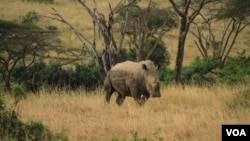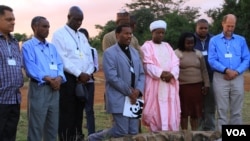NAIROBI —
In an attempt to curb the slaughter of endangered species across Africa, the World Wildlife Fund (WWF) and the Alliance of Religions and Conservation (ARC) have put together a consortium of religious leaders to confront poachers and people who buy products derived from the animals they kill.
The WWF calls the illegal wildlife trade today’s biggest threat to the survival of many endangered species. In 2011, the organization reports, Africa saw the highest rates of animal killings in more than 20 years and the largest-scale illegal-ivory seizures ever recorded — equivalent to the tusks of more than 4,000 dead elephants.
In countries that are home to endangered animals such as elephants, rhinos and tigers, rule of law is often weak, law enforcement spotty, and corruption rife. The WWF and ARC have partnered with Christian, Muslim, Hindu, Jewish, Buddhist and traditional faith leaders from across Africa to unite against poachers.
Broad reach, influence
Broad reach, influence
According to the 2007 Atlas of Religion, the faiths reach 85 percent of the world’s 6.79-billion people.
“In every religious community, religious leaders are the people they turn to for advice, the people who lead their communities through dramas and traumas and strife and are still there at the end of it," says ARC Secretary-General Martin Palmer, who hopes religious leaders may find success in teaching followers that poaching destroys God’s creation and is therefore akin to blasphemy. "Government officials: they disappear; NGOs pack up and go home when it gets tough. But the religions are of the people, by the people, for the people. That’s why they’re powerful.”
Imam Kasozi, a Muslim leader from Uganda, uses his influence to warn followers that spiritual consequences for poaching in the afterlife will be much stronger than those meted out on Earth.
Killing endangered species, he says, is not only illegal, but immoral.
“We warn and advise people not to kill because of greed," he says. "It is a criminal offense, and, in front of God, a criminal offense will send you to the gallows on the Day of Judgment.”
A large-scale enterprise
According to Sam Weru, WWF conservation director in Kenya for eight years, the greed of which Kasozi speaks is precisely what alarms activists and conservationists.
“I mean, people are not poaching elephants [or] rhino for food," he says, emphasizing the scale and complexity of the problem. "They are hacking the horn and taking off with it, leaving the whole carcass there.
"Look at the level of investment into poaching," he adds. "It’s the not the man with the poisoned bows and arrows or a trap. These are organized gangs that come with automatic weapons. That is not somebody who is looking for food. That is somebody who is looking for big-time money.”
In China, Thailand, and Vietnam, where products derived from these animals is highest, ivory from elephants, considered a sign of wealth and status, is used for carvings and religious items, while so-called treatments from rhino horn are thought to cure cancer, remedy hangovers or work as sexual aphrodisiacs.
Dekila Chungyalpa, director of WWF’s Sacred Earth program, says these concoctions have no medicinal value.
“All of these are myths, because if you look at rhino horn and you think about the composition of rhino horn, well, that’s horse hooves," she says. "Basically, people are eating something similar to horse hoof and convinced that that’s going to cure their cancer, and there’s a huge amount of profit that’s coming out of that.”
A need to coexist
ARC's Palmer says that some practitioners of faith, however, are using the philosophy of traditional Chinese medicine to battle the poachers. Some Daoists, for example, argue that an imbalance of the cosmic forces of yin and yang can result in new or continuing illness.
“Because you’ve actually destroyed the delicate balance that God has created, that medicine’s not going to work," he says. "Not only is it not going to work, but it might actually be detrimental to you, it might poison you."
In defense of the endangered species, he says, Daoists are undermining market forces by challenging the psychology of Chinese traditional medicine.
"They’re saying, you can spend $100,000 on something that includes a bit of a tiger and a bit of an elephant and a bit of a rhino, but because you are responsible for killing those animals, and pushing them to extinction, that medicine is never going to work.”
Reverend Edward Matuvhulye of Zimbabwe's United Church of Christ says animals and humans are God’s creatures — a message underscored by all the faiths.
"They were also created by God as we were created by God," he says, describing the animals as an important aspect of human life. "Therefore, there is a need for us to coexist.”
According to a Global Financial Integrity report, the illegal wildlife trade is the fifth largest illicit transnational activity in the world, after counterfeiting and the illegal trades in drugs, people, and oil.
It has an estimated value of $7.8 billion to $10 billion per year.






